Pros and Cons of Living Full-Time in a Travel Trailer
Our adventure living full-time in a travel trailer and exploring the continent was, in a word, unforgettable. Traveling, hiking, camping, and finding solitude and peace in the outdoors is a beautiful way of life. It is an opportunity to grow and explore our limits.
The pros and cons of living full-time in a travel trailer will be different for each individual. We’ve written fairly extensively about our personal experiences. And we have shared plenty of lessons and RV living tips that will hopefully help you in the decision-making process if you’re considering this route.
Until now, we haven’t put together a list of the pros and cons of living in a travel trailer. Well, it’s time we give you a holistic view of the positive and negative aspects of living in a tiny home on wheels.
Living Full-Time in a Travel Trailer
Let me start off by saying that my level of gratitude for this opportunity we had to RV full time is completely off the charts. I know how much of a gift that is.
I understand that the majority of the population could never even imagine having the chance to do what we did, for a variety of reasons. And I am thankful every day that we managed to turn the idea into a reality.
For us, this was not a “money-saving” move, not by a long shot. But what we gained from our RV travels was priceless in so many ways.
I also want to point out that this list of pros and cons is based on an experience of both living and traveling in our RV. The list would likely be different had we stayed in a single location.
With that, let’s take a realistic look at the pros and cons, the positives and negatives, of living full-time in a travel trailer…from our perspective at least.
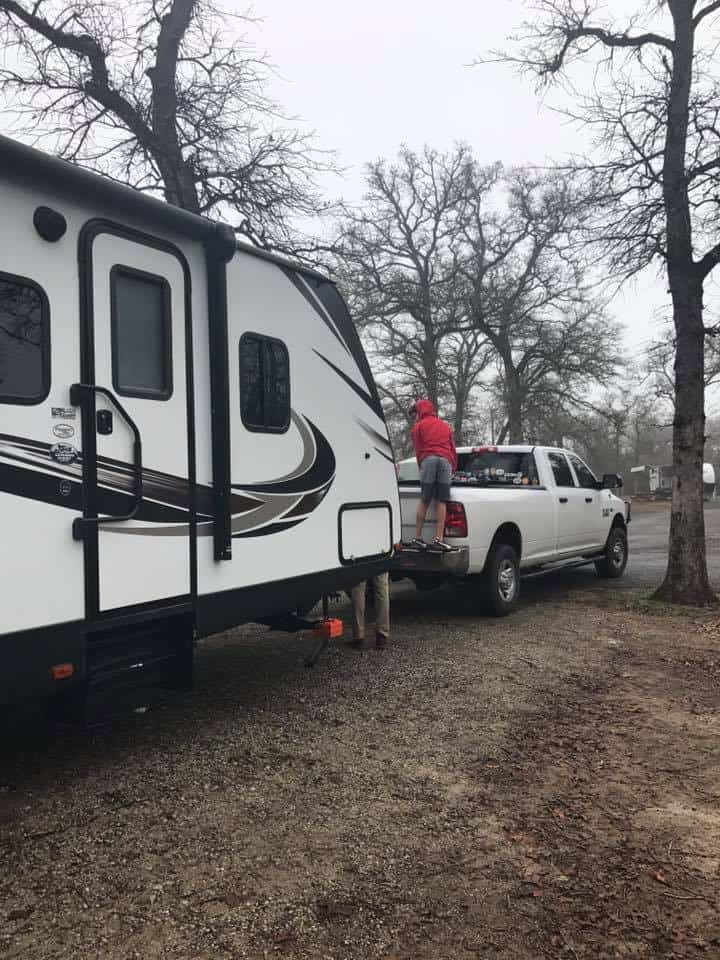
Pro – Lower Overall Purchase Price and Maintenance/Repair Costs
As you might have picked up on in some of my other posts on the site, I am a details and a numbers kind of guy by nature. In most situations, I need the numbers to make sense before I can fully buy into a choice or a direction.
That’s not to say that I haven’t learned a thing or two about letting go from our full-time RVing experience. But still, details and numbers are in my DNA.
Choosing the Right Type of RV for Our Family
So when it came time to decide on the type of RV we were prepared to live in full-time, I took the decision very seriously. Since we were new to the world of RVing, we started out by considering every single type of RV from Class A down to travel trailer.
But, after our salesman provided detailed information about financing an RV, we quickly narrowed our search down to focus solely on travel trailers.
It’s what made sense for us when we really started looking at the required down payment. We’re talking about 20% to 30% of the purchase price. And that’s if you have a “good” credit score of 700 or higher.
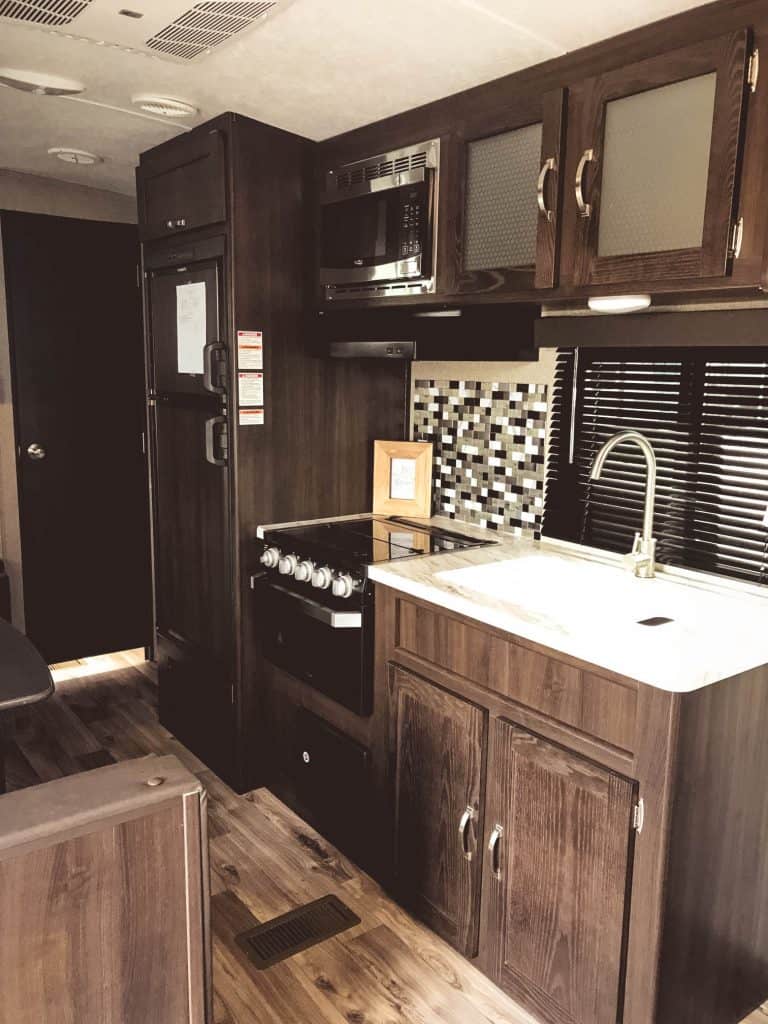
Simpler is Better, Less is More
As a child, my dad influenced me early and often with his perspective on simplicity…at least when it came to automobiles.
I distinctly remember when I was about 11 years old and we were buying the first new car that I had ever experienced: a gold 1986 Mazda 626 sedan.
It was the first time that I remember hearing him talk about how we didn’t need the “bells and whistles” in a car. Extra amenities like power seats and windows was nothing more than an opportunity for something to go wrong.
He was more interested in the overall reliability ratings and whether the engine and transmission would stand the test of time. Since he was preparing to move our family thousands of miles east and into another country (Canada), the reliability factor took on even greater significance.
He wanted it to get us there safely and without added hassle and expense, rather than pamper us along the way.
Honestly, I think in a lot of ways my own perspective on material things in life mirrors his. As we looked at dozens and dozens of different travel trailers, that perspective resurfaced and became a priority.
I would look at a fancy upgrade and think, “How long until that feature goes haywire?” I would see a model that had two slides instead of one and think, “That’s just another chance that we could face those dreaded issues with a slide I’ve been reading about.”
Travel Trailer Model is the Best Fit for Us
You may see this as pessimistic. I view it as pragmatic. For lack of a better term, it’s like playing the odds in my favor.
For our maiden voyage in this RV, I wanted to reduce the chances of potential issues and lower the probability of incurring high maintenance and repair costs. My best bet was to keep things simple while also ensuring we enjoyed a reasonable level of comfort and convenience.
A travel trailer absolutely made the most sense from a cost and simplicity standpoint. I have no regrets and view these factors as major pros for the travel trailer option.
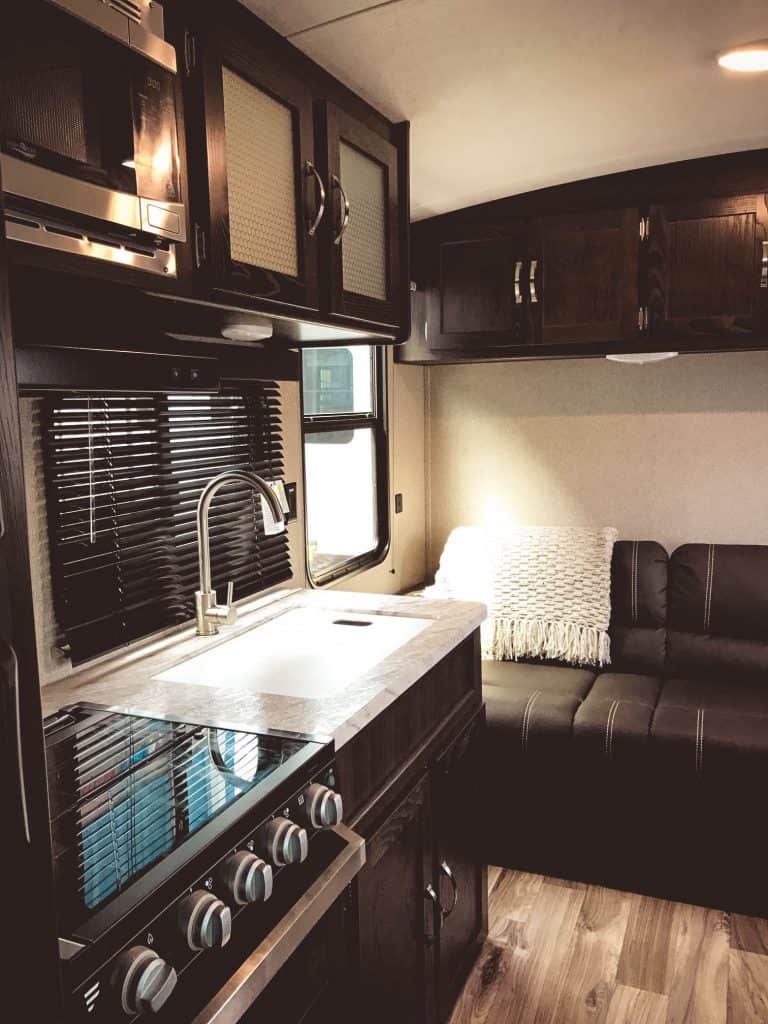
Con – You’ll Rub a Few More Elbows with Family
Generally speaking, you are going to have less space in a travel trailer than you would experience in a fifth wheel. It seems pretty obvious, right?
Not only will travel trailers normally be shorter in length, but they also typically have fewer slide-outs, which means less interior space. A large fifth wheel model can have up to five slides. By comparison, travel trailers normally top out at two, or maybe three in rare situations.
Cooperation and Patience is Required
But what does that tighter space make things look like on a daily basis?
It looks like more coordination and cooperation during meal prep time to navigate the common space that serves as the kitchen/living/dining area.
It means using the dining room table as a study area, a reading area, for watching TV, then for sleeping. All of those activities in one space requires several transitions and adjustments each day.
You may also need to squeeze in closer around the dining table than you normally would in a house. Our norm was mom and dad eating on the couch with three kids at the RV dining table. This helped us avoid bumping elbows at meal time.
Be Creative to Make Good Use of Livable Space
But are there ways to address this issue and create some more livable space. It helps when you’re traveling in warmer climates. After nearly a year on the road, we purchased a fantastic pop-up gazebo. It created additional outdoor living space protected from insects and light rain.
We all wished we would have made that purchase sooner. It not only provided the additional space that is so precious during full-time RV travel, but also enhanced the amount of time we spent outdoors.
Looking back, I still feel it was one of the best purchases we made during our time on the road.
So yes, you will have less indoor space to work with. But if you are willing to bring patience, cooperation and creativity along for the ride you can absolutely still make it a positive experience.
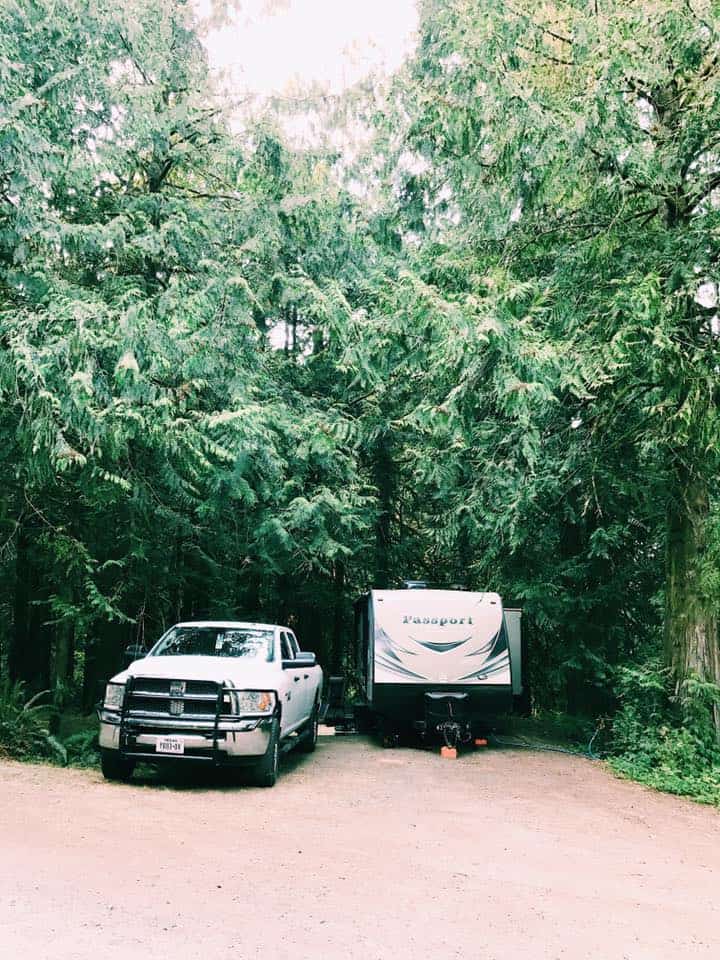
Pro – You’ll Need Less Truck to Tow a Travel Trailer
Surprise! It’s another financial advantage of a travel trailer! What can I say? It’s an important factor in my world of limited resources. (If you live in a world of unlimited resources, the next Pro that I cover below may still steer you in the travel trailer direction.)
As we shopped for an RV and narrowed our search down to towables, it was never far from my mind that an additional purchase was just around the corner: A truck capable of safely pulling whatever RV we purchased.
I had picked the brains of truck-owning friends and scoured online RV forums as I wrestled from the very beginning with what type of truck to purchase when the time came.
Many RVers proved to be outspoken proponents of buying the beefiest truck you possibly could from the beginning (normally meaning a 1-ton diesel).
Their reasoning was that even if you buy a smaller RV now (travel trailer), odds are good that you will want to upgrade one of these days, requiring a larger truck.
They felt strongly that buying the “max truck” now would keep you from having to upgrade both your RV and your truck at the same time down the road, which could prove very difficult to pull off financially.
Resale Value is a Factor
Many also felt that the far higher resale values on diesel trucks, compared to gas trucks, further justified the higher purchase price now. Given the number of miles I was planning to drive whatever truck I purchased, this reasoning carried the most weight with me.
And it almost pushed me to opt for a 3/4 ton diesel instead of the 3/4 ton gas model that I eventually purchased.
But at the end of the day, I wasn’t prepared to deal with that additional expense (easily $10-15K more) that a diesel truck would require.
I was also intimidated by the additional maintenance and care that a diesel engine requires, having never even owned a truck before.
And because I was looking closely at purchasing a travel trailer with a gross weight of about 6,500 pounds, and had no thought of ever going with a larger RV than this, I knew that a 3/4 ton gas truck could get the job done.
At the end of our journey I owed $9,000 more than the truck was worth when I eventually decided to trade it in. We put over 48K miles on the truck, so the value probably should not have been a shock, however disappointing.
Yes, I could have reduced that negative equity by trying to sell it instead of trading it in. In our situation, that wasn’t really a feasible option.
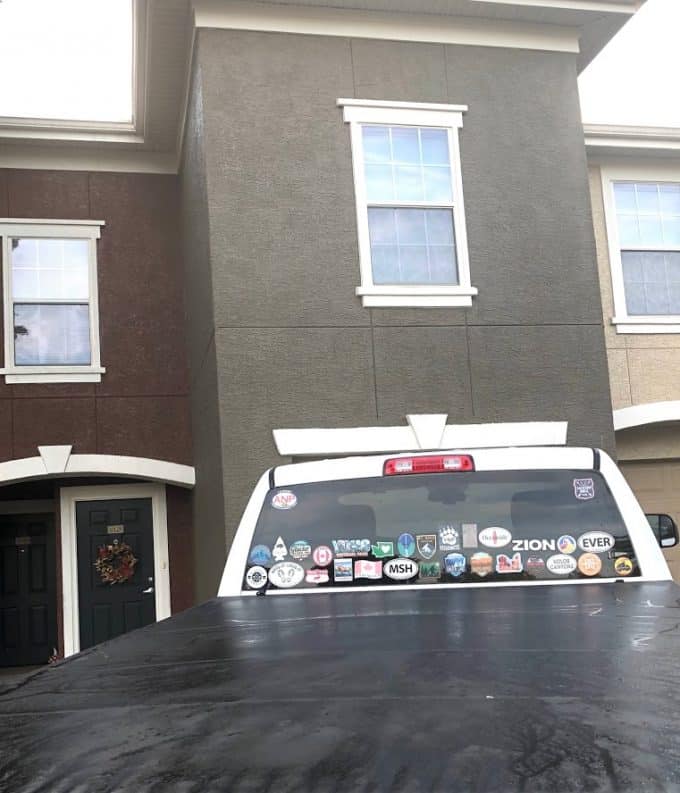
Needing Less Truck is a Pro (with a caveat)
Looking back on it now, I can’t really say that I regret going with a gas truck despite the “financial reckoning” after the fact.
Is it possible I could have come out better financially if I had gone with a diesel? Yes, it’s possible. But that option would also have required a considerably higher monthly payment during our time on the road, which might have given me heart palpitations.
So the caveat is this: You CAN go with less truck if you purchase a travel trailer compared to a fifth wheel. However, only you know if you SHOULD go this route after considering all the factors involved.
Con – No Movie Nights At Your Place
During our travels, we spent a couple of weeks traveling in Canada. We traveled to Prince Edward Island and Nova Scotia with a family we met on the road. It was some of the best times that we had during our journey.
Our friends were traveling in a large fifth wheel that held their family of five. And it was a really spacious and convenient rig that we thought was amazing.
Our family of five visited with them in their fifth wheel for both a movie night and a top-notch brunch while in Nova Scotia. We watched the movie “RV”, starring Robin Williams. Believe it or not, it was the first time any of us had seen it.
This is in addition to the countless times that our 14 year old spent the night in their rig with their boys. So yeah, great memories all around. That time together, with all ten of us enjoying one space, was really enjoyable and memorable.
When we commented about how nice it was to be able to entertain folks (something our rig did not have the space to accommodate), they said that this was one of the reasons that they had gone with this fifth wheel.
They knew it would allow them to be hospitable with folks they met and that was important to them.
Of course, we would have the same opportunity if the weather permitted and we wanted to entertain outside our rig. But definitely not inside.
Take that into consideration when you make your decision about which rig is the best fit for you.
Pro – Easier Access to More Locations
When we were making plans for our travels, I had big plans about being able to stay in state and national parks as much as possible.
I quickly picked up on the fact that each park like this, however, would have its own limits on RV size that were normally more stringent than your typical RV park or private campground.
Basically, I determined that if I kept our rig under 30 feet in total length (with tongue included), I should have access to more than 85% of state and national park campgrounds.
Since I was already unsure if I wanted to tow anything larger than that 30-foot rig, this was kind of the deciding factor for me.
Staying under 30 feet would give me an acceptable level of comfort with towing (something I was very new to) and would not limit our options in locations that we were very interested in visiting.
While we didn’t end up staying in nearly as many state and national parks as I had hoped we would, I still don’t regret the decision to stay under that 30-foot mark.
It would have made some of our RV parks and campground stays MUCH more stressful and complicated to have a larger rig. We barely fit into some of the spots!
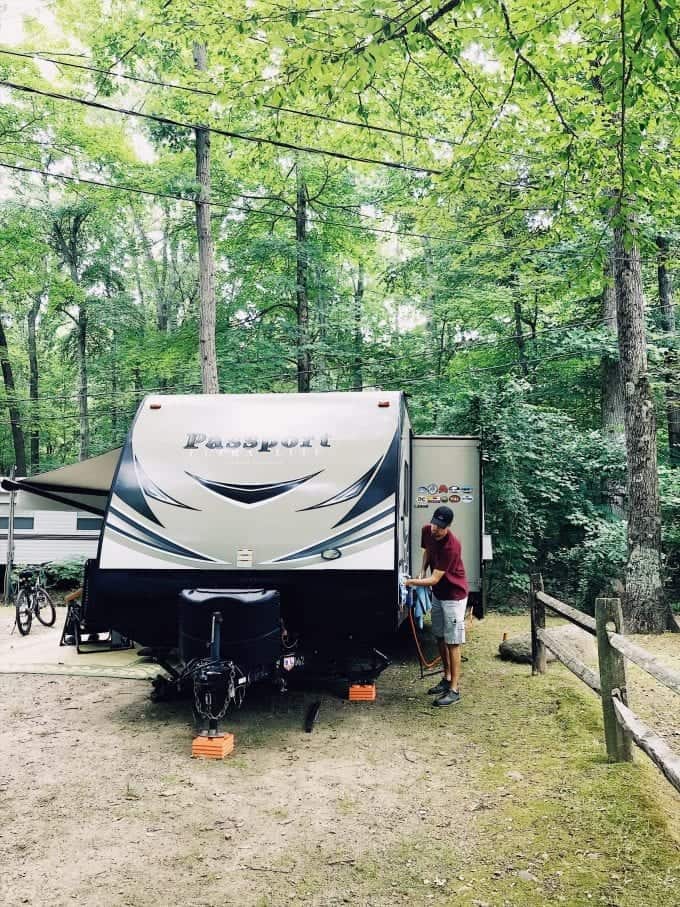
RV Height Matters
When you’re RVing the western portion of the US and Canada, you don’t run into many spots where the height of your RV requires you to reroute and potentially add distance and time to your trip.
However, if you find yourself drifting toward the northeastern US, you will quickly discover that the height matters a whole lot more.
All of a sudden, you’ve got to be on high alert and ensure that you don’t head down the wrong road with low clearances that will cause you serious problems.
In our 10′ 6″ high travel trailer, we ran into only one situation in the northeast where we had to reroute because of clearance issues. If we had been in a fifth wheel, with typical heights of 12′ to 13′ or more, it would have been a far different story.
Yes, there are resources and apps available to you if you are in a larger rig that will help you route away from low clearance roadways. It could add time and distance to your travels, but it will keep you safe and out of trouble.
Con – Interior Clearance Is Much Lower
In our 26 foot RV, we had ceiling heights of about 6′ 6″, which is fairly typical. Since our tallest occupant was about 6′ 1″, we were able to make it work without any major difficulties.
I will say that I knocked my head going through our exterior doorway on more than one occasion. It required me and my oldest son to stoop down a bit to get through without incident.
There is no doubt that the lower ceilings in the travel trailers give you a “cozier” feel. Some might say a “tighter” feel. For some folks, this isn’t a problem. For others, it may be a night and day difference.
Because I have to say that hanging out in our friend’s fifth wheel while we were traveling with them was just a completely different experience.
With ceiling heights at 9′ or so, it obviously just gives the whole space a very open and welcoming feel. The difference between the two really is a night and day difference, in my opinion.
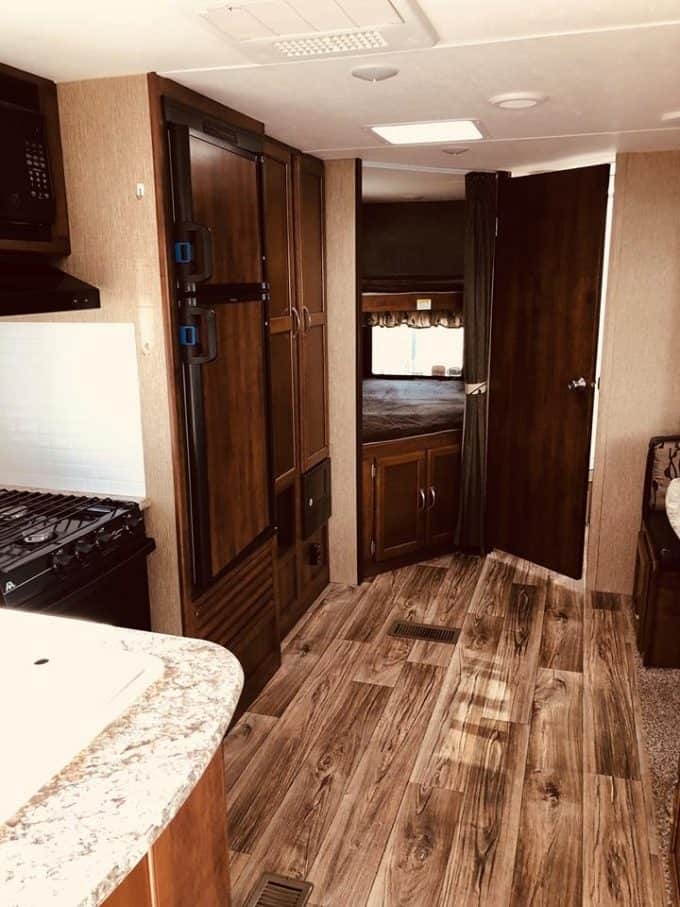
The lower ceilings of the travel trailer are going to lead to amplified noise as well, so be aware of that if you have loud individuals (you know, small kids or dogs) along for the ride.
Since my ears are pretty sensitive to noise, this would probably have proved very challenging for me with small kids or dogs in the rig.
Lots of factors to consider, I know. I hope that these “nuances” of each space help you to make the decision that is best for you.
Would You Choose a Travel Trailer?
As I said from the beginning, all of these pros and cons are based on our personal experience of traveling and living full time in a travel trailer. These are the things that we viewed as a good fit and as issues for our family.
Of course some of these items may make no difference to you whatsoever, and some may be game-changers. Hopefully, at a minimum, each pro and con will spark ideas and considerations to help you make an informed decision.
My advice is simply to be sure to talk through all of these pros and cons, and any others you can come up with, with everyone who will be living in the RV.
You need as many different perspectives and opinions as possible with such a major decision like this. Best to see things as clearly as possible now rather than realize your oversight after the purchase.
As you move toward the possibility of living full time in a travel trailer or any other RV that fits your lifestyle, we wish you the best! Cheers to grand adventures, priceless memories, and smooth travels!

Todd loves a competitive game of table tennis, a breathtaking hike, and exploring new places. He lived and traveled in an RV with his family as they traveled throughout much of the US and parts of Canada. Todd has extensive knowledge about RV travel, safety, and accessories and has shared many of his stories here on TREKKN. When he’s not busy launching and building small businesses, you may find him staring at pictures of Glacier National Park (probably his favorite spot on earth).


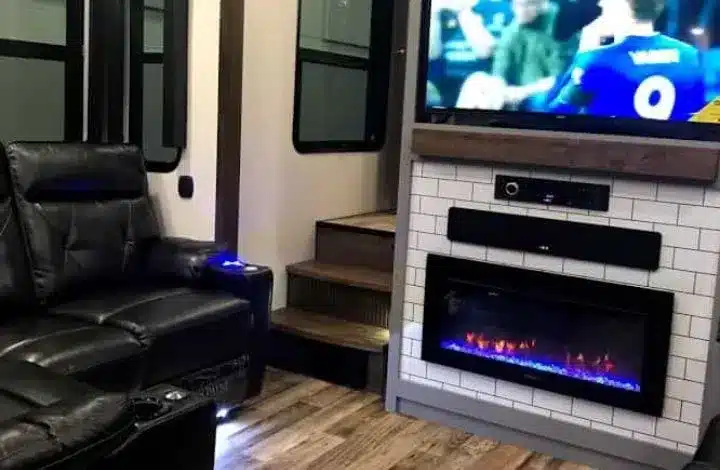
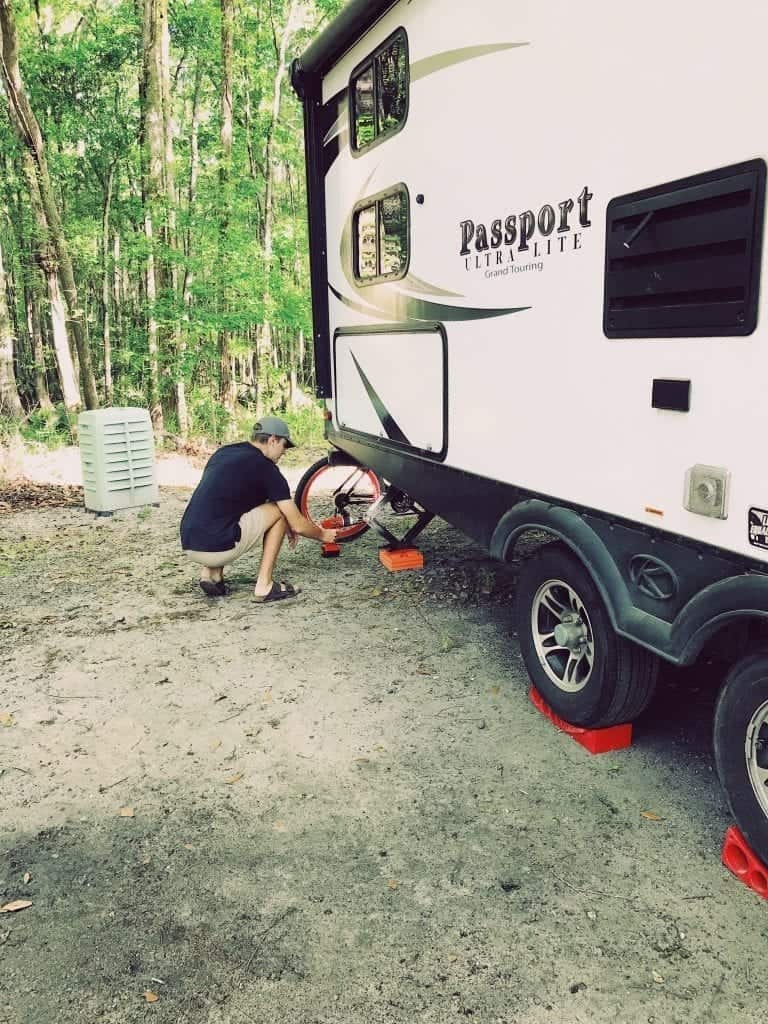
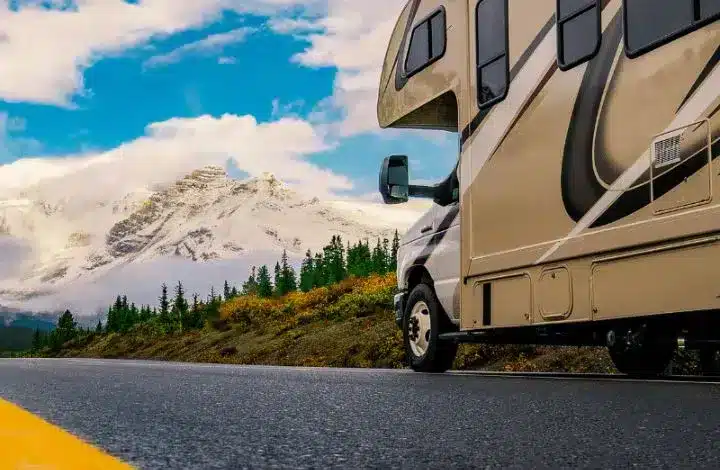
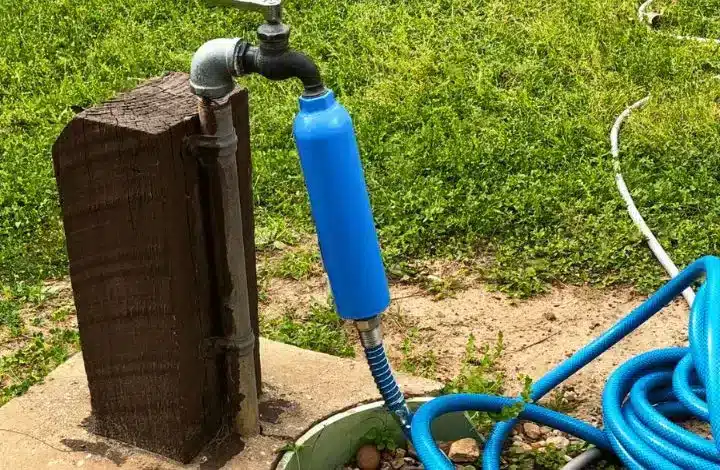
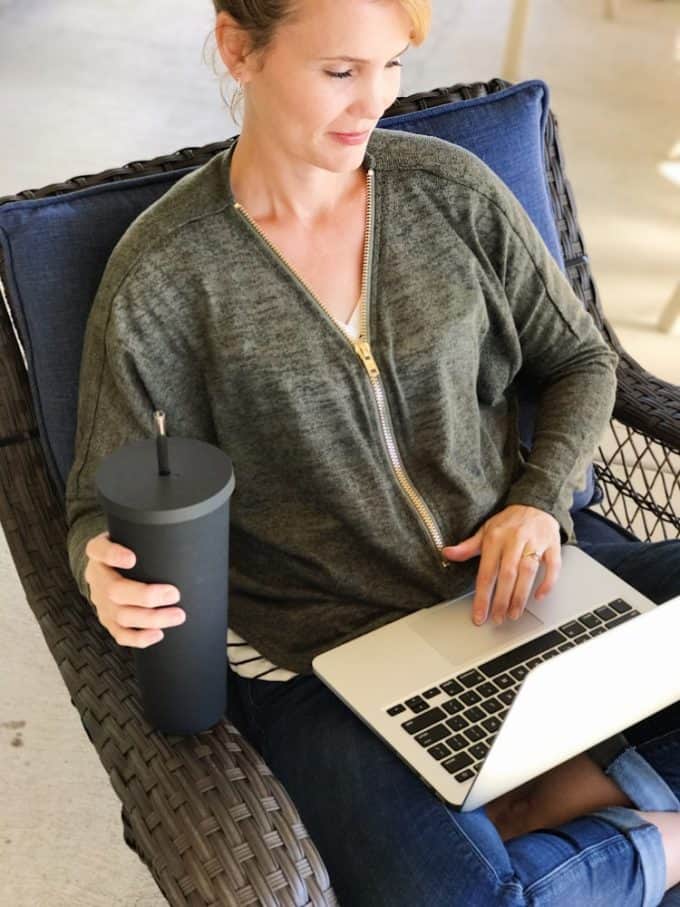
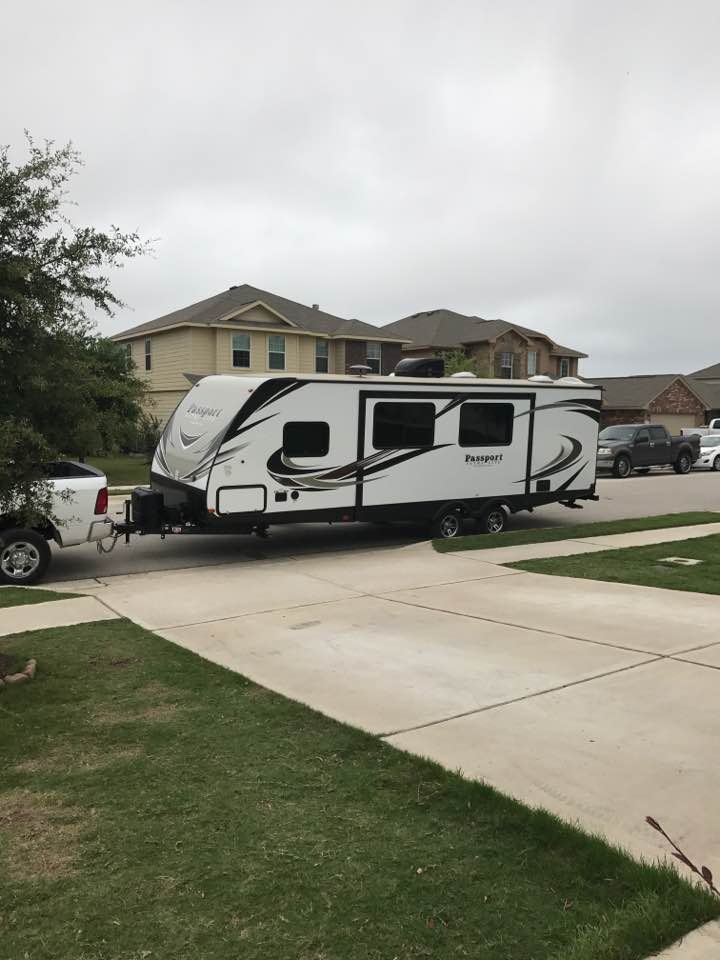
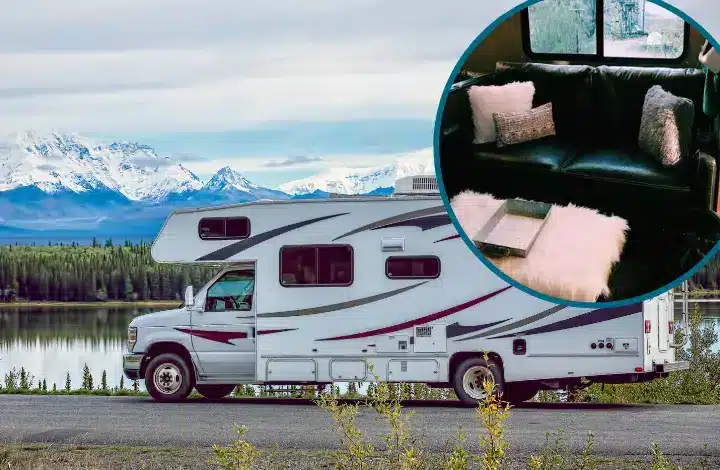
For many of us we can’t afford a 200k RV and 50k truck to pull it with when Houses are that much or even less. I have live in 20′ 9″ foot pull behind “Camper” that needed to be gutted I bought for $50 off of Craigslist and can be pulled by my SUV that I already own. It started out as a 18 foot camper that I added 2′ 9″ to the frame and rebuilt it from the frame up, to build a “wet room” for a bathroom and a clothes closet area in the other 4 feet. Before deciding to do this I did a lot of research, first and foremost I didn’t buy the standard Camper 2×2, I bought 2×4’s and simply cut them in half, why? cost, while a 2×4 is 60% more than a 2×2 you get twice the board foot out of it so I saved 40% on the framing alone, Then I used spray foam insulation and used discontinued wood paneling from Lowes also for pennies on the dollar for the inside walls and for power I installed an RV solar power unit that doesn’t need a power pack or storage bank. I bought the toilet, kitchen sink and kitchen cabinets at the Habitat for Humanity Re-store for pennies on the dollar and threw a coat of paint on them, Then I bought a “hide-a-bed” couch at a flea market for $15 and took the guts of the hide-a-bed out threw away the rest of the dingy couch and refurbed the bed frame and built my own couch out wood and pieces of foam that I cut and covered with fabric, when I’m not sleeping the bed folds neatly up and becomes the bottom of the couch. I bought a 3/4 apartment sized refrigerator at a discount appliance outlet for next to nothing and bought a multi-functioning air fryer/oven combo that does 9 different things to cook in along with an Insta-pot. No actual stove needed so I actually have counterspace. I realize that it wouldn’t work for a family but it works great for me and my financee.
Hey Bryan! Thanks so much for your comment…and wow! I am seriously impressed with your commitment to getting a project like that done on the cheap. Kudos to you!
I definitely hear you about not being able to afford some of the “luxury” options out there. We got started with an older truck and relatively cheap and small travel trailer (compared to most full-time RVers at least) because that is what we could swing at the time. That is how we made a dream come true. You seem to have that same commitment.
I love to hear that you have created an “adventure capsule” that works for YOU, because ultimately that is the only thing that matters. Whatever works for you!
Peace, Bryan! Thanks for stopping by and I hope you will stick around.